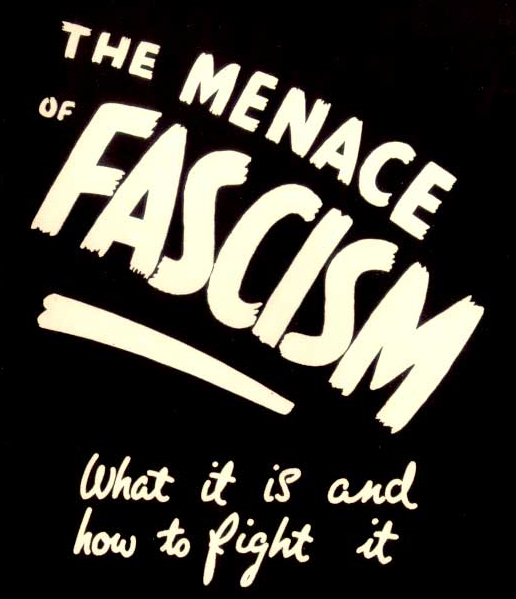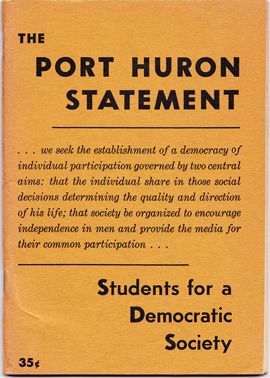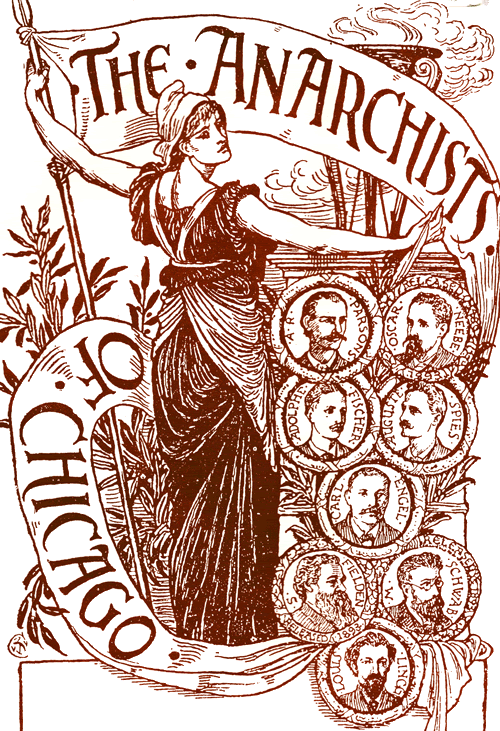
Some words become so overused or misused that they become practically meaningless. “Fascist” seems to be one of those words. If you perform a Web search, you’ll discover nearly twenty-million results, ranging from historical information relating to the Fascist governments of Italy, Germany and others during the first half of the Twentieth Century, to current wild-eyed conspiracy theory, to polemics on the right condemning “eco-fascists,” “feminazis” and such.
I’ve posted some thoughts and resources about this subject here in the past. I believe that Fascist tendencies are real (and perhaps even ascendent) in American political life today. The threat they pose to justice and freedom cannot be overstated. Therefore, it is important to understand what Fascism really is, to recognize it when one sees it, and to oppose it with all of our will and resources.
First of all, here is what Fascism is not. Fascism is not simply any ideology that seeks to pressure or coerce or impose compliance. It is not ever a leftist, or Liberal ideology. Fascism should not be conflated with authoritarianism (although authoritarianism is certainly a central aspect). Fascism does not merely mean oppression, intolerance, bullying or totalitarianism.
George Orwell addressed these misuses of the term in 1944, noting that he had heard it applied to Conservatives, Socialists, Communists, Catholics, fox hunters, bull fighting, shopkeepers, Olympic Committees and others. He also made note of the central issue in defining Fascism. “It is impossible to define Fascism satisfactorily without making admissions which neither the Fascists themselves, nor the Conservatives, nor Socialists of any colour, are willing to make. All one can do for the moment is to use the word with a certain amount of circumspection and not, as is usually done, degrade it to the level of a swearword.”
What is Fascism, really? Mirriam-Webster defines Fascism as “a political philosophy, movement, or regime (as that of the Fascisti) that exalts nation and often race above the individual and that stands for a centralized autocratic government headed by a dictatorial leader, severe economic and social regimentation, and forcible suppression of opposition.”
So Fascism is, first and foremost, nationalistic in the extreme. It is also racist, authoritarian, regimented and coercive. Fascism stands opposed to liberty, equality and international solidarity – the classic hallmarks of Liberal Democracy (and the ideals of The Enlightenment).
Laurence W. Britt did a thorough study of Fascist regimes for a novel he wrote about right-wing extremists coming to power in the United States. He outlined the fourteen common characteristics of Fascism in Nazi Germany, Mussolini’s Italy, Franco’s Spain, Salazar’s Portugal, Papadopoulos’s Greece, Pinochet’s Chile, and Suharto’s Indonesia. I would encourage you to read the entire article as published in Free Enquiry. Here are the bullet points.
- Powerful and Continuing Expressions of Nationalism
- Disdain for the Importance of Human Rights
- Identification of Enemies/Scapegoats as a Unifying Cause
- The Supremacy of the Military/Avid Militarism
- Rampant Sexism
- A Controlled Mass Media
- Obsession with National Security
- Religion and Ruling Elite Tied Together
- Power of Corporations Protected
- Power of Labor Suppressed or Eliminated
- Disdain and Suppression of Intellectuals and the Arts
- Obsession with Crime and Punishment
- Rampant Cronyism and Corruption
- Fraudulent Elections
Here is how I summarized the basic framework of Fascism in an earlier post.
- The core Fascist values are nationalism, Anti-Marxism, and a profound disgust for Liberal Democracy.
- Fascists glorify the past, before the country was “debased” by foreigners, homosexuals, minority religions and the like. Fascists see themselves as a reaction to those who are a threat to “our way of life,” and they identify (and attack, sometimes literally) these scapegoats.
- The movement (and the state) is organized around corporatism and largely serves corporate interests.
- Violence against external and internal “enemies” is encouraged to the point of glorification. Wars, torture, executions, assassinations and the use of excessive force by the police are welcomed in the battle to “protect us.” There is an obsession with militarism, and likewise with crime and punishment. There is a flexible attitude toward basic human rights and the rule of law, if infringements are seen as helping the cause.
- There is utter disdain for (and there are attacks made on) labor unions, intellectuals and the arts.
This sounds all too familiar, yes?
What can we do to fight against Fascism? As is the case with so many issues in life, the first step is to recognize the problem. It’s important that we see things for what they are, and call them by their proper names. When we see people coalescing around a nationalistic philosophy which denigrates the arts and intellect, which glorifies militarism, which uses religion to justify discrimination against homosexuals and Muslims, which seeks to scapegoat immigrants and the poor, which attacks organized labor, which serves the wealthy and the corporations – that is Fascism, plain and simple. We should call it that, and we should debunk the oft-asserted notion that such a philosophy is equally valid to others. The history of the last century has shown us again and again what happens when this insidious ideology is allowed to take root.
We should also miss no opportunity to stand up for freedom, equality and solidarity. We must support those who are the victims of Fascist rhetoric. This means speaking up for human rights, equality and justice for all – for homosexuals, for immigrants, for minority races and religions, for the captives in our burgeoning prison system, for the poor and the dispossessed. We must support our labor unions when they come under attack in the name of “fiscal restraint” and must guard against the infringement of the right to organize. We must defend and support artists and intellectuals, in both the marketplace and in academia. We must oppose the idea that uninformed opinions and specious arguments are valid and are equal with fact-based, well informed and well reasoned ones. We must boycott and otherwise oppose the moneyed and corporate interests in favor of the small, the local and the economically oppressed.
Perhaps more than anything else, we must gather together with others of good will in our local communities to build relationships of trust and commitment, dedicated to the values and practice of democracy, justice and cooperation.
If this sounds like a tall order, that’s because it is. I have come to believe that it is now a matter of survival, not just for our liberties, but for human life on the good Earth.
James Waterman Wise once said that Fascism would come to America “wrapped up in the American flag and heralded as a plea for liberty and preservation of The Constitution.” It would appear that such an ideology has, indeed, come – and very much as he predicted.
Shall we stand up?
★ ★ ★
More Reading:
FASCISM – What It Is and How To Fight It – Leon Trotsky
Fascism, Anyone? – Laurence W. Britt, Free Inquiry magazine, Volume 23, Number 2.
What is Fascism? – George Orwell, London Tribune, 1944
Quotes on Fascism – Wikiquote
The Menace of Fascism: What it is and How to Fight It – Ted Grant – Revolutionary Communist Party Pamphlet, 1948
Eternal Fascism: Fourteen Ways of Looking at a Blackshirt – Umberto Eco








